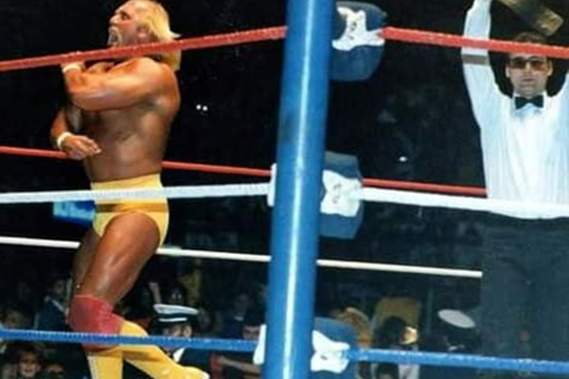Even as Hulkamania was catching fire around the world, former WWE referee Jimmy Korderas says Hulk Hogan always treated him like “one of the boys.”
When Korderas joined what was then called the WWF in 1985, one of his first jobs was picking up wrestlers from the airport and driving them to Toronto’s Maple Leaf Gardens.
“Hulk was one of the first guys I had to pick up, and right away, he made me feel comfortable and at home, like I belonged,” says Korderas, a Toronto native.
On one occasion, while giving Hogan and his then-wife Linda a ride, Korderas caught Hogan’s eyes in the rear-view mirror as Linda gushed about Toronto.
“The entire time Linda was talking about how beautiful the city is, this is her first time, oh my goodness. I could see Hulk’s eyes going, ‘Oh boy,’” he laughs.
“When we got to the building, he pulled me aside and said, ‘Brother, I’m sorry.’ I said, ‘For what?’ He said, ‘She kept going on and on.’ I got a chuckle out of it and so did he. That’s the nature he had … Here’s this megastar and he’s concerned about my needs.”
Hogan, born Terry Gene Bollea, died Thursday at 71.
Known for his stars-and-stripes swagger, handlebar moustache and chest-thumping catchphrases, Hogan was the face of professional wrestling’s golden era and one of the most recognizable pop culture figures of the 1980s.
Korderas would referee many of Hogan’s matches over the years and says he felt “like a kid in a candy store” doing so.
“You’re trying to curb your emotions while you’re out there trying to do your job, but at the same time you’re thinking, ‘Oh my God, I’m in here with Hulk Hogan,’” says the 63-year-old, reached by phone Thursday in Toronto.
“He was the guy. He was the catalyst. If it wasn’t for him, I don’t think wrestling would have taken off the way it did, hit the mainstream the way it did and become the global juggernaut it is today.”
Get daily National news
Get the day’s top news, political, economic, and current affairs headlines, delivered to your inbox once a day.
Korderas vividly recalls officiating several hard-hitting bouts between Hogan and Mr. Perfect, but one that looms especially large is the inaugural Survivor Series in 1987, when Hogan’s team battled André the Giant’s in a stacked main event.
“I have this picture of myself and (referee) Joey Marella in the ring trying to keep André the Giant and Hulk Hogan separated,” he says.
“Other guys got a great reaction from the crowd, whether it was cheering or booing, but it was different when Hogan entered the ring … He would flex for the crowd, he’d put his hand to his ear, he would pose and that got incredible reactions. He knew it was more about the entertainment aspects as opposed to the actual technical aspect of pro wrestling.”
Years later, Hogan reminded the world of his unmatched ability to command a crowd at WrestleMania X8 in Toronto in 2002, when he faced Dwayne (The Rock) Johnson in a blockbuster showdown. Hogan was firmly in his villainous “Hollywood” persona, while The Rock was WWE’s top babyface — but the Toronto crowd flipped the script and threw its support behind Hogan.
While Korderas didn’t referee the match, he snuck out to watch it live and says several wrestlers did the same.
“The crowd literally got them to call an audible and switch roles. They were backing Hogan because they remember him as their superhero from the past,” he recalls.
“Ask anybody who was there, whether they were in the crowd or in the locker room, that building was literally shaking on its foundations when those two were staring off across the ring.”
Behind the scenes, Korderas says Hogan treated him like “part of the locker room” — ribbing included.
During the ’80s, then-CEO Vince McMahon enforced a strict no-smoking policy in WWE. Korderas remembers sneaking a cigarette before stepping into an elevator — only to find McMahon, Hogan, Brutus (The Barber) Beefcake and several other wrestlers already inside.
“The entire ride down, Vince is reading me the riot act about how bad smoking is,” Korderas says.
“While he’s doing that, Hulk was giving me little elbow shots in the back, so I’m jerking forward. Vince is like, ‘Are you all right? What’s wrong with you?’ I said, ‘No, I am good.’ And the whole time, they’re all laughing. So Hulk was a bit of a prankster at times.”
But Hogan was also a controversial figure at times. In 2015, WWE terminated his contract after leaked audio captured him using a racial slur and describing himself as “a racist, to a point.” He later issued a public apology.
Korderas says the news “disappointed” him, and that he had “never witnessed that side” of Hogan.
“It’s hard when you hear that stuff about people who you consider friends,” he says.
“It makes me feel sad to see that side.”
Still, he says it’s tough to deny Hogan’s role in reshaping the wrestling industry.
“The business of wrestling may not be as hot and as popular as it is today if it wasn’t for him, because he is arguably the main reason why it is so,” Korderas says.
“Take the other stuff away from it, the controversies — you can’t deny that he was the catalyst for this.”
https://globalnews.ca/news/11303982/toronto-referee-remembers-hulk-hogan/


